Related Research Articles

Lincoln Theodore Monroe Andrew Perry, better known by the stage name Stepin Fetchit, was an American vaudevillian, comedian, and film actor of Jamaican and Bahamian descent, considered to be the first black actor to have a successful film career. His highest profile was during the 1930s in films and on stage, when his persona of Stepin Fetchit was billed as the "Laziest Man in the World".
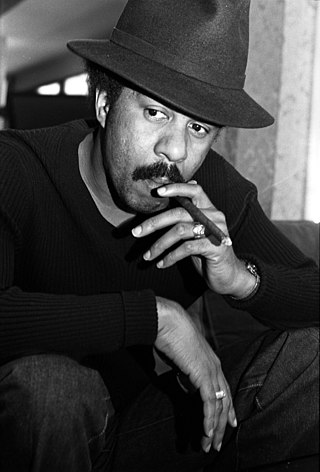
Richard Franklin Lennox Thomas Pryor Sr. was an American stand-up comedian and actor. He reached a broad audience with his trenchant observations and storytelling style, and is widely regarded as one of the greatest and most important stand-up comedians of all time. Pryor won a Primetime Emmy Award and five Grammy Awards. He received the first Kennedy Center Mark Twain Prize for American Humor in 1998. He won the Writers Guild of America Award in 1974. He was listed at number one on Comedy Central's list of all-time greatest stand-up comedians. In 2017, Rolling Stone ranked him first on its list of the 50 best stand-up comics of all time.
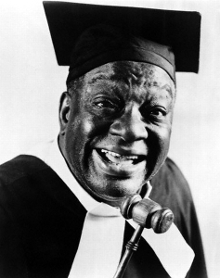
Dewey "Pigmeat" Markham was an African American entertainer. Though best known as a comedian, Markham was also a singer, dancer, and actor. His nickname came from a stage routine, in which he declared himself to be "Sweet Poppa Pigmeat". He was sometimes credited in films as Pigmeat "Alamo" Markham.

LaWanda Page was an American actress, comedian and dancer whose career spanned six decades. Crowned "The Queen of Comedy" or "The Black Queen of Comedy", Page melded blue humor, signifyin' and observational comedy with jokes about sexuality, race relations, African-American culture and religion. She released five solo albums, including the 1977 gold-selling Watch It, Sucker!, and collaborated on two albums with the comedy group Skillet, Leroy & Co. As an actress, Page is best known for portraying the Bible-toting and sharp-tongued Esther Anderson on the popular television sitcom Sanford and Son, which aired from 1972 until 1977. Page reprised the role in the short-lived television shows Sanford Arms (1976–1977) and Sanford (1980–1981). She also costarred in the 1979 short-lived series Detective School. Throughout her career, Page advocated for fair pay and equal opportunities for black performers.
Theatre Owners Booking Association, or T.O.B.A., was the vaudeville circuit for African American performers in the 1920s. The theaters mostly had white owners, though about a third of them had Black owners, including the recently restored Morton Theater in Athens, Georgia, originally operated by "Pinky" Monroe Morton, and Douglass Theatre in Macon, Georgia owned and operated by Charles Henry Douglass. Theater owners booked jazz and blues musicians and singers, comedians, and other performers, including the classically trained, such as operatic soprano Sissieretta Jones, known as "The Black Patti", for black audiences.

Sam Lucas was an American actor, comedian, singer and songwriter. His birth year has also been reported as 1839, 1841, 1848 and 1850.
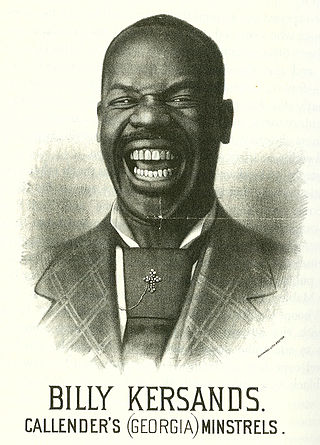
Billy Kersands was an African-American comedian and dancer. He was the most popular black comedian of his day, best known for his work in blackface minstrelsy. In addition to his skillful acrobatics, dancing, singing, and instrument playing, Kersands was renowned for his comic routines involving his large mouth, which he could contort comically or fill with objects such as billiard balls or saucers. His stage persona was that of the dim-witted black man of the type that had been popularized in white minstrel shows. Modern commentators such as Mel Watkins cite him as one of the earliest black entertainers to have faced the dilemma of striking a balance between social satire and the reinforcement of negative stereotypes.

Butterbeans and Susie were an American comedy duo comprising Jodie Edwards and Susie Edwards. They married in 1917, and performed together until the early 1960s. Their act, a combination of marital quarrels, comic dances, and racy singing, proved popular on the Theatre Owners Booking Association (TOBA) tour. They later moved to vaudeville and appeared for a time with the blackface minstrel troupe the Rabbit's Foot Company.

Lew Johnson was an African-American owner and business manager of blackface minstrel troupes composed of African-American performers. His career began in the mid-1860s and spanned 25 years. Johnson is the only black minstrel-troupe owner to have enjoyed any consistent success. This was due to his keeping well away from the lucrative markets dominated by white owners. He primarily toured in the Midwestern and Western United States, playing countless one-nighters in rural settlements. The people in these areas could be racist, which made the itinerant lifestyle a hard one for Johnson and his minstrels. Johnson made a brief venture into the Eastern market in 1886, but his troupe fared poorly and fled back west.
American humor refers collectively to the conventions and common threads that tie together humor in the United States. It is often defined in comparison to the humor of another country – for example, how it is different from British humor and Canadian humor. It is, however, difficult to say what makes a particular type or subject of humor particularly American. Humor usually concerns aspects of American culture, and depends on the historical and current development of the country's culture. The extent to which an individual will personally find something humorous obviously depends on a host of absolute and relative variables, including, but not limited to geographical location, culture, maturity, level of education, and context. People of different countries will therefore find different situations funny. Just as American culture has many aspects which differ from other nations, these cultural differences may be a barrier to how humor translates to other countries.
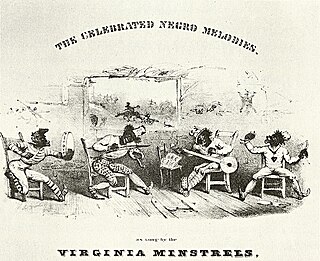
Hokum is a particular song type of American blues music—a song which uses extended analogies or euphemistic terms to make humorous, sexual innuendos. This trope goes back to early dirty blues recordings, enjoyed huge commercial success in the 1920s and 1930s, and is used from time to time in modern American blues and blues rock.

Melvin Edward "Slappy" White was an American comedian and actor. He worked with Redd Foxx on the Chitlin' Circuit of stand-up comedy during the 1950s and 1960s. He appeared on the television shows Sanford and Son, That's My Mama, Blossom, and Cybill and in the films Mr. Saturday Night and Amazon Women on the Moon.

William Best, known professionally as Willie Best or Sleep 'n' Eat, was an American television and film actor.
Mel Watkins is an American critic and author. A former staff member at The New York Times, he has written extensively about comedy and African-American literature and has often appeared as a commentator in television documentaries about entertainment history and performers such as Chris Rock and Richard Pryor.
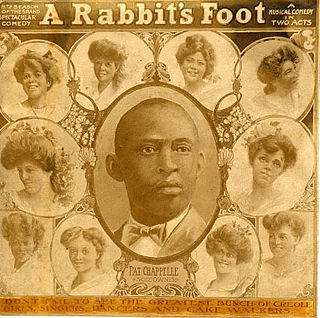
Black Vaudeville is a term that specifically describes Vaudeville-era African American entertainers and the milieus of dance, music, and theatrical performances they created. Spanning the years between the 1880s and early 1930s, these acts not only brought elements and influences unique to American black culture directly to African Americans but ultimately spread them beyond to both white American society and Europe.
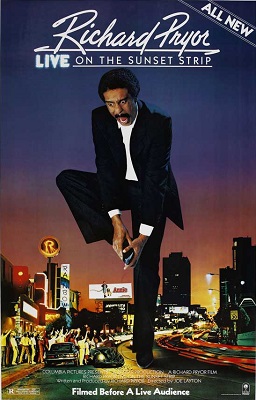
Richard Pryor: Live on the Sunset Strip is a 1982 American stand-up comedy film directed by Joe Layton. It stars and was produced by Richard Pryor, who also wrote the screenplay with Paul Mooney. The film was released alongside his album of the same name in 1982, and the most financially lucrative of the comedian's concert films. The material includes Pryor's frank discussion of his drug addiction and the night that he caught on fire while freebasing cocaine in 1980.
Lydia Nicole is an American actress, comedian, writer and producer based out of Los Angeles, California. Her career in the entertainment industry began in 1972 with the Inner City Broadcasting Corporation at New York City R&B station, WBLS-FM. In 1981, she made her debut as an actress guest starring on The Greatest American Hero. Nicole is best known for her role as Rafaela in Stand and Deliver, and her current project, web series Common Sense Mamita.
The Apollo Comedy Hour is a sketch-comedy that aired in first-run syndication from 1992-1995. The series was filmed the legendary Apollo Theater in Harlem, New York. It was produced by the same people who produced It's Showtime at the Apollo.
Modern stand-up comedy began around the turn of the century, evolving from a variety of sources including minstrel shows and vaudeville. Early stand-up comedians spoke directly to the audience as themselves without props or costumes, which distinguished these acts from vaudeville performances. These comics stood in front of the curtain during their shows, like early 20th century "front cloth" stand-up comics in Britain and Ireland whose numbers allowed the stage behind them to be re-set for another act.
References
- 1 2 Macke, Matthew (7 September 2016). "Seeds on rocky soil: A history of African-American comedy". The Observer.
- ↑ "A Short History of Black Comedy". NPR. 26 February 2007.
- ↑ Littleton, Darryl (2006). Black Comedians on Black Comedy: How African-Americans Taught Us to Laugh. Hal Leonard Corporation. ISBN 978-1-55783-730-1.
- ↑ Watkins, Mel (1999). On the Real Side: A History of African American Comedy. Lawrence Hill Books. ISBN 978-1-55652-351-9.
- ↑ Watkins, Mel (2002). African American Humor: The Best Black Comedy from Slavery to Today. Lawrence Hill Books. ISBN 978-1-55652-430-1.
- ↑ Watkins, Mel (1994). On the Real Side: Laughing, Lying, and Signifying: the Underground Tradition of African-American Humor that Transformed American Culture, from Slavery to Richard Pryor. Simon & Schuster. ISBN 978-0-671-68982-7.
- ↑ Beatty, Paul (2008). Hokum: An Anthology of African-American Humor. Bloomsbury Publishing USA. ISBN 978-1-59691-716-3.
- ↑ Czajkowski, Elise (15 May 2012). "Inside the History of Black Comedy in 'Why We Laugh'". Vulture.
- ↑ Gordon, Dexter B. (1998). "Humor in African American Discourse: Speaking of Oppression". Journal of Black Studies. 29 (2): 254–276. doi:10.1177/002193479802900207. JSTOR 2668092. S2CID 144388475.
- ↑ Berlin, Edward A (1983). "Cole and Johnson Brothers' The Evolution of 'Ragtime'". Current Musicology. No. 36. pp. 21–39. ProQuest 1297273957.
- ↑ Lewis, Julian Kimble, Alyson. "The 30 Best Black Sitcoms of All Time". Complex.
{{cite web}}: CS1 maint: multiple names: authors list (link) - ↑ Watkins, Mel (2010). Stepin Fetchit: The Life & Times of Lincoln Perry. Knopf Doubleday Publishing Group. ISBN 978-0-307-54750-7.[ page needed ]